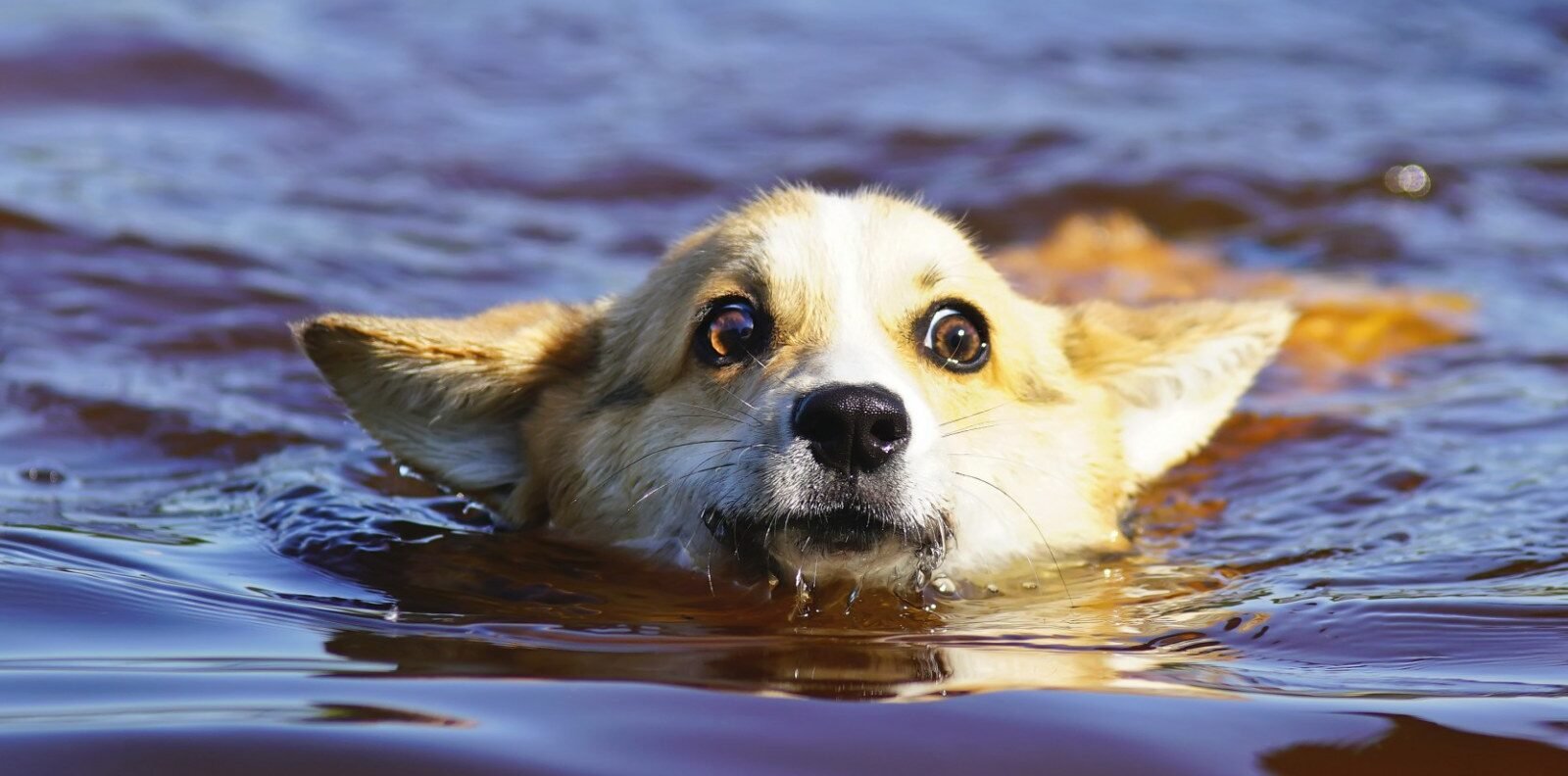Not all Corgis are enthusiastic about taking a dip. In fact, some of them downright dislike it! But fear not, dear reader, for we are here to explore the reasons behind this aversion and uncover the truth about Corgis and their swimming ability.
From the excitement of beach trips to the importance of keeping your furry friend safe while splashing around, we will cover it all. So, grab your towel and join us as we navigate the waters to unravel the mystery of whether Corgis truly have a love for water or if they prefer to stay dry on the shore.
Table of Contents
Corgis and Water Dislike
Corgis and water dislike is a well-known fact. They’ll squirm and wriggle, desperately trying to escape from the wet terror. Corgis have a deep-rooted fear of water, making water play or water sports out of the question. They would rather stay dry and cozy on land than risk getting their fluffy fur wet.
Even water toys fail to entice them, as they prefer chasing balls or playing with squeaky toys on solid ground. Water training is also a challenge for corgis, as their aversion to water makes it difficult for them to focus and learn.
It’s important to respect their fear and not force them into water-related activities. Instead, find other ways to keep them entertained and active, like taking them on walks or playing games indoors.
Corgi Swimming Ability
Contrary to popular belief, corgis have a natural ability to swim and can enjoy swimming and various water activities. While they may not be the most athletic swimmers like retrievers or spaniels, corgis can still participate in water exercises and have fun with water toys.
It’s important to build their water confidence through positive reinforcement and gradual training. Start by introducing them to shallow water and gradually increase the depth as they become more comfortable. Always supervise them during water activities to ensure their safety.
Swimming not only provides a great form of exercise for corgis, but it can also be a fun bonding experience for you and your furry companion.
Do Corgis Like Water and Baths?
Diving into a crystal-clear pool with your furry friend by your side, one might witness the corgi’s impressive swimming skills, showcasing their natural ability in the water. Corgis are known for their love of water sports and can excel in activities like dock diving and retrieving balls from the water.
However, not all corgis are fond of water. Some corgis may have a fear of water, which can be attributed to a lack of exposure or a bad experience. It’s important to introduce corgis to water gradually and positively. Providing them with water toys can also help make water play more enjoyable for them.
While corgis are generally good swimmers, they can be prone to certain water-related health issues such as ear infections and obesity. Regular water training and proper care can help prevent these issues and ensure that your corgi has a safe and enjoyable experience in the water.
Can Corgis go to the beach?
Corgis can enjoy frolicking on sandy beaches and splashing in the waves. However, when taking your furry friend to the beach, it’s important to prioritize their safety.
Remember to bring water toys specifically designed for dogs to keep them entertained and engaged. Beach games like fetch or frisbee can also be a great way to bond with your Corgi and keep them active.
Additionally, consider investing in beach attire for your pet, such as a life jacket, to ensure their safety in case of strong currents or unexpected waves.
Lastly, it’s essential to provide proper beach training to your Corgi, teaching them basic commands and ensuring they understand boundaries to prevent any accidents or mishaps.
With these precautions in place, your Corgi can have a safe and enjoyable time at the beach.
How can I keep my Corgi safe while swimming?
One way to ensure your Corgi stays safe while taking a dip is by equipping them with a ‘paw-fect’ life jacket. This will act as a buoy to keep them afloat.
Water safety for corgis is essential because they are not natural swimmers. This is due to their short legs and long bodies.
Common swimming hazards for corgis include exhaustion, hypothermia, and drowning.
To help your Corgi become comfortable in the water, it’s important to gradually introduce them to it and provide proper training. Start with shallow water and use positive reinforcement to build their confidence.
Always supervise your Corgi closely when they are near water, whether it’s at the beach or a pool.
Additionally, it’s crucial to teach them pool safety, such as showing them where the steps are and how to exit the pool safely.
With these proper precautions, Corgis can enjoy water-related activities while staying safe.
Do corgis need life jackets?
Equipping a Corgi with a life jacket is a prudent measure to ensure their safety while swimming. While Corgis are generally good swimmers, there are certain situations where a life jacket becomes a necessity.
Water safety should always be a top priority, especially when corgis are near bodies of water, such as lakes or pools. If you plan on taking your Corgi boating, a life jacket is essential to keep them safe in case of an accident or if they accidentally fall overboard.
Additionally, some Corgis may have water anxiety or be less confident swimmers, making a life jacket even more crucial. Swimming lessons can be beneficial for Corgis to improve their swimming skills and build their confidence in the water, but a life jacket can provide an extra layer of protection and peace of mind.
How to Properly Expose Your Corgi to Water?
Take your furry friend on a watery adventure and let them dip their paws into the liquid playground of splashing waves and shimmering ripples.
When it comes to exposing corgis to water safely, it’s important to take it slow and make it a positive experience.
Start by introducing your corgi to shallow water, such as a kiddie pool or a calm lake. Allow them to explore at their own pace and never force them into the water.
Use treats and praise to encourage them and make it a fun activity. Gradually increase the depth of the water as they become more comfortable.
Water activities for corgis can include playing fetch in the water or even trying out water therapy, which can be beneficial for their joints and muscles.
With patience and gentle guidance, you can teach your corgi to enjoy the wonders of swimming and make water a joyous part of their life.
Do corgis have waterproof fur?
Corgis’ fur possesses a natural water-resistant quality, allowing them to enjoy aquatic activities without worry. Their double coat, consisting of a thick, weather-resistant outer layer and a soft, insulating undercoat, helps to repel water and keep them dry. This waterproof fur is a result of their evolutionary adaptation to the wet and cold climate of their native Wales.
The outer layer of a corgi’s fur is hydrophobic, meaning it repels water. This helps to prevent their fur from becoming saturated and allows them to stay relatively dry even when exposed to water. It also helps to insulate them, keeping their body heat regulated in water.
Corgis are generally known to be water-loving dogs and enjoy a variety of water activities such as swimming, playing in sprinklers, or splashing in puddles. However, it is important to consider the water temperature when exposing them to water. Corgis can be sensitive to cold temperatures and may be at risk of hypothermia if exposed to cold water for extended periods.
While corgis have waterproof fur, it is still important to take precautions and monitor them during water activities. Excessive exposure to water can lead to skin issues, such as dermatitis, and ear infections. It is essential to dry them thoroughly after water activities and always provide fresh water for them to drink to prevent dehydration.
Conclusion
Congratulations on finishing the article! Now that you know all about corgis and water, it’s clear that they have a love-hate relationship with it.
While some corgis may dislike water and struggle with swimming, others may enjoy it and have great swimming abilities.
It’s important to keep your corgi safe while swimming by using life jackets and proper supervision.
And remember, corgis may not have waterproof fur, so be cautious when exposing them to water.
So, whether your corgi is a water lover or a water avoider, make sure to provide them with a safe and enjoyable water experience.



